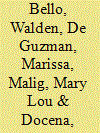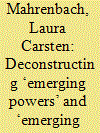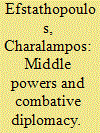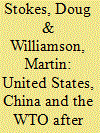|
|
|
Sort Order |
|
|
|
Items / Page
|
|
|
|
|
|
|
| Srl | Item |
| 1 |
ID:
065258


|
|
|
|
|
| Publication |
London, Zed Books, 2004.
|
| Description |
xiii, 342p.
|
| Standard Number |
1842776312
|
|
|
|
|
|
|
|
|
|
|
|
Copies: C:1/I:0,R:0,Q:0
Circulation
| Accession# | Call# | Current Location | Status | Policy | Location |
| 050027 | 338.9599/BEL 050027 | Main | On Shelf | General | |
|
|
|
|
| 2 |
ID:
142006


|
|
|
|
|
| Summary/Abstract |
Academic literature and the media offer a variety of monikers for emerging states like Brazil, India and China, most prominently, ‘emerging powers’ and ‘emerging markets’. This article argues the terms used to describe these states create assumptions about their behaviour in global governance (GG). In order to accurately assess the impact of emerging states on international institutions, it is necessary to more systematically examine their current participation in GG. Does the use of power and economic interests in GG negotiations distinguish emerging states from traditional powers, as the ‘emerging’ part of these terms suggests? And can the content of GG negotiations predict the dominance of each factor, as implied by the ‘power/market’ part? This article tackles these questions by comparing the behaviour of one emerging state (India) and one traditional power (the United States) in negotiations at the World Trade Organisation and the United Nations Security Council. The results demonstrate that, while there is clearly something distinctive about at least India’s participation in GG, focussing on power or economic interests alone is insufficient to explain that distinctiveness or its implications for relations between rising and traditional powers in GG.
|
|
|
|
|
|
|
|
|
|
|
|
|
|
|
|
| 3 |
ID:
111570


|
|
|
|
|
| Publication |
2012.
|
| Summary/Abstract |
Middle Powers are generally understood to perform diplomatic functions of constructive engagement and consensus-building to facilitate agreement in international negotiations. Middle Powers may, however, adopt more confrontational roles, especially when their accommodative functions become deficient. Whilst theoretical perspectives on Middle Powers account for such roles, limited empirical evidence has been provided to explore the conditions under which they revert to combative diplomacy. This article contributes to this area by examining the role of South Africa in the 2003 Cancun Ministerial Conference of the World Trade Organisation. During this period, South Africa shifted to a more confrontational approach epitomised by the heightening of its public diplomacy against developed countries and its co-leadership of the G-20 coalition of developing countries. The Cancun Ministerial collapse reflected both the possibilities and limitations of combative diplomacy as South Africa enhanced its international prestige but failed to extract any meaningful concessions, whilst triggering the threat of diplomatic retaliation by the major trading powers.
|
|
|
|
|
|
|
|
|
|
|
|
|
|
|
|
| 4 |
ID:
177071


|
|
|
|
|
| Summary/Abstract |
A hegemon can destroy its international regimes, but what happens when it does not possess the capacity to reconstitute a regime to its liking? Drawing on structural power theory, our article examines President Nixon’s historic attacks on the Bretton Woods international monetary regime to help illuminate President Trump’s attacks on the World Trade Organisation (WTO). In both cases regime destruction was driven to a large extent by a desire to contain rivals: Europe for Nixon, China for Trump. Drawing on original archival material, our case study analysis shows that while the United States possessed sufficient negative structural power to derail Bretton Woods, it lacked sufficient positive structural power to create the new monetary structure Nixon wanted. Trump faces a similar dilemma: he can block the WTO regime, but cannot necessarily replace it with one to the United States’ liking. China is too powerful and possesses too much structural power of its own to give up its WTO privileges without a fight. After the Coronavirus pandemic, it is unlikely that China can prevent the United States from wrecking the WTO trade regime, but very likely it can block US attempts to create a successor regime tailored exclusively to US requirements.
|
|
|
|
|
|
|
|
|
|
|
|
|
|
|
|
|
|
|
|
|